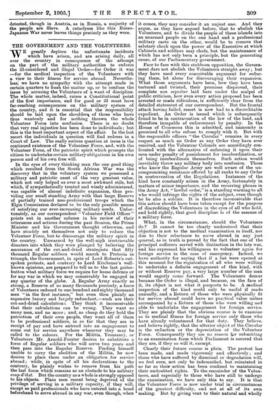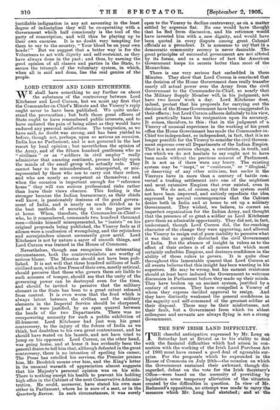THE GOVERNMENT AND THE VOLUNTEERS.
WE greatly deplore the unfortunate incidents which have arisen, and are arising daily, all over the country in consequence of the attempt on the part of the military authorities to enforce the ill-considered and illegal Order—for Order it was —for the medical inspection of the Volunteers with a view to their fitness for service abroad. Neverthe- less; we have no sympathy with the attempt made in certain quarters to hush the matter up, or to confuse the issue by accusing the Volunteers of 'a want of discipline. The whole matter, indeed, raises a Constitutional point of the first importance, and for good or ill must have far-reaching consequences on the military system of the country, and it is essential that the responsibility should be laid upon the shoulder' of those who have thus wantonly and for nothing thrown the whole Volunteer Force into confusion. There is no doubt that very real injustice has been done to individuals ; but this is the least important aspect of the affair. In the last resort the individuals in question will find redress in a Court of Law. The really serious question at issue is the continued existence of the Volunteer Force, and, with the Volunteer Force, of the patriotic spirit which prompts the citizen to undertake certain military obligations in his own person and of his own free will.
In the eyes of every thinking man the one good thing which• resulted from the South African War was the discovery that in the voluntary system we possessed a military and patriotic asset of the very greatest value, which not only helped us over a most awkward stile, but which, if sympathetically treated and wisely administered, was capable of almost indefinite expansion, thus pro- viding our small standing Army with that large Reserve of partially trained non-professional troops which the Elgin Commission declared to be the only possible means of satisfying our ever-increasing military needs. Unfor- tunately, as our correspondent "Volunteer Field Officer" points out in another column in his review of their utterances and actions during the past Session, the Prime Minister and his Government thought otherwise, and have steadily set themselves not only to reduce the Volunteer Force, but to discourage the military spirit in the country. Unwarned by the well-nigh irretrievable disasters into which they were plunged by believing the assurances of the cut-and-dried strategists that fifty thousand Regular soldiers would march to Pretoria in triumph, the Government, in spite of Lord Roberts's out- spoken protests, and contrary to Lord Kitchener's well- known opinions, are prepared to tell us to the last gaiter- button what military force we require for home defence or for any war in which we may conceivably be engaged in any quarter of the globe. A Regular Army exactly so strong, a Reserve of so many thousands precisely, a force of Volunteers reduced to one hundred and eighty thousand men "in the first instance," but even then plainly an expensive luxury and largely redundant,—such are their cut-and-dried ealculationi They think it inconceivable that their calculations can be wrong. They want so many men, and no more ; and, so cheap do they hold the patriotism of their own people, they want all of them to be professional soldiers, in so far that they are in receipt of pay and have entered into an engagement to come out for service anywhere whenever they may be called to the colours. For the Militia, Yeomanry, or Volunteers Mr. Arnold-Forster desires to substitute a force of Regular soldiers who will serve two years and then pass into the Regular Reserve. Finding himself unable to carry the abolition of the Militia, he now desires to place them under an obligation for service abroad; while, in spite of all his declarations to the contrary, he plainly wishes to remove from his path the last force which remains as an obstacle to his military coup d'etat. But the country as a whole is strongly opposed to his objects. Plain men resent being deprived of the privilege of serving in a military capacity, if they will, except as paid professionals who have entered into a bond beforehand to serve abroad in any war, even though, when it comes, they may consider it an unjust one. And they argue, as they have argued before, that to abolish the Volunteers, and to divide the people of these islands into an unarmed people on the one hand. and a professional military caste on the other, would be to remove that salutary check upon the power of the Executive at which Cabinets and soldiers may chafe, but the maintenance of which has not only been a principle, but the generating cause, of our Parliamentary government.
Face to face with this stubborn opposition, the Govern- ment dare not abolish the Volunteers straight away ; but they have used every conceivable argument for reduc- ing them, let alone for discouraging their expansion. What those arguments have been, how they have been tortured and twisted, their premises disproved, their complete non sequitur laid bare under the scalpel of public criticism, how even every action proposed has been arrested or made ridiculous, is sufficiently clear from the detailed statement of our correspondent. But the frontal attack having failed, resort is now had to a discreditable expedient. An Order is issued which is subsequently found to be in contravention of the law of the land, and therefore incapable of enforcement by penalty. In the House of Commons this is admitted, and immunity is promised to all who refuse to comply with it. But with the responsible officers "the Circular" remains in every respect as much an Order as any Order they have ever received, and the Volunteer Colonels are accordingly con- fronted with the alternative of enforcing it upon their men under penalty of punishment for insubordination, or of being insubordinate themselves. Such action would inevitably throw any military body into confusion. Those who know the Regular Army are well aware of the un- compromising resistance offered by all ranks to any Order in contravention of the Regulations. Instances of the kind have constantly arisen in the Army, fortunately in matters of minor importance, and the recurring phrase in the Army Act, "lawful order," is a standing warning to all who would infringe the rights of the subject, even though lie be also a soldier. It is therefore inconceivable that this action should have been taken except for the purpose of discrediting the Volunteers in the eyes of all who hold, and hold rightly, that good discipline is of the essence of a military force.
What, in the circumstances, should the Volunteers do ? It cannot be too clearly understood that their objection is not to the medical examination in itself, nor due to their reluctance to serve abroad in any just quarrel, as in truth is proved by the fact that one of the principal sufferers served with distinction in the late war, and has expressed his willingness to volunteer again for foreign service in the case of emergency. Indeed, we have authority for saying that if a list were opened at this moment for the registration of all who were willing to undertake a definite engagement of this kind, with or without Reserve pay, a very large number of the men would eagerly come forward. The Volunteers demur because the Order is illegal, and because, on the fees of it, its object is not what it purports to be. A medical inspection of the kind could only be useful if made annually, and a Return of those who were physically fit for service abroad could have no practical value unless accompanied by a Return of those who were willing and able to undertake the engagement for foreign service. They see plainly that the obvious course is to examine as to medical fitness for foreign service only those who have already volunteered for that duty. They believe, and believe rightly, that the ulterior object of the Circular is the reduction or the depreciation of the Volunteer Force. Consequently they see no reason for submitting to an examination from which Parliament is assured that they are, if they so will it, exempt.
Clearly their future course is plain. The protest has been made, and made vigorously and effectively ; and those who have suffered by dismissal or degradation will, we feel sure, not only be indemnified, but reinstated in so far as their action has been confined to maintaining their undoubted rights. To the remainder of the Volun- teers, and especially to those who have still to undergo the examination, we have only this to say. It is that the Volunteer Force is now under trial in circumstances of the greatest difficulty, and not at all of its own making. But by giving vent to their natural and wholly justifiable indignation in any act savouring in the least degree of indiscipline they will be co-operating with a Government which half consciously is the tool of the party of conscription, and will thus be playing up to their own enemies. It is no doubt very tempting for them to Ray to the country, "Your blood be on your own heads ! " But we suggest that a better way is for the Volunteers to act with dignity and. self-restraint, as they have always done in the past; and thus, by earning the good opinion of all classes and parties in the State, to secure the triumph of the voluntary system, in which, when all is said and done, lies the real genius of the people.



































 Previous page
Previous page